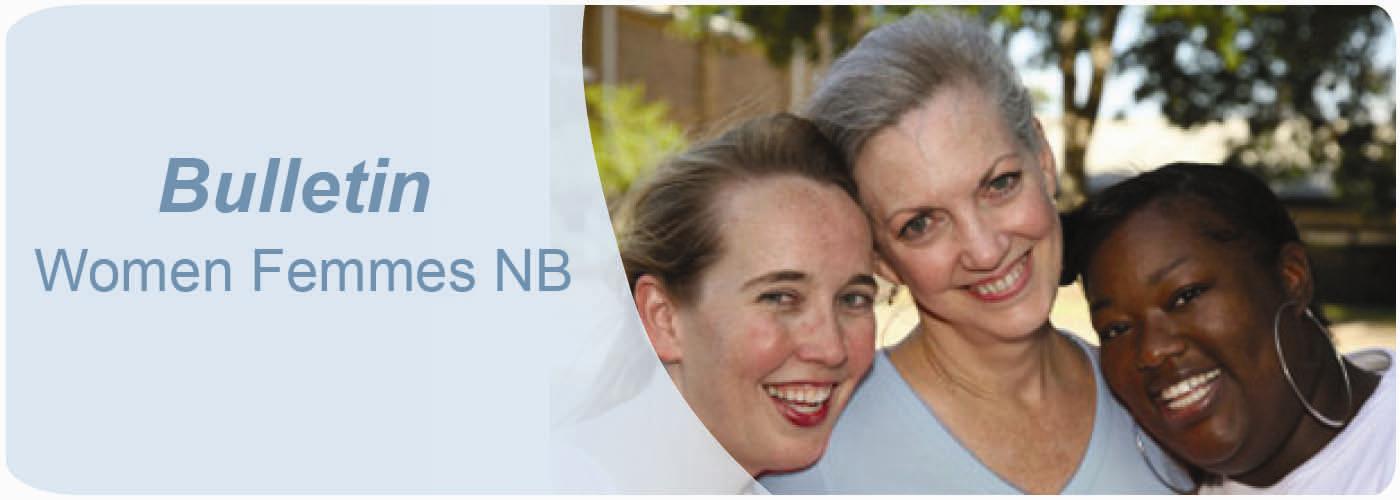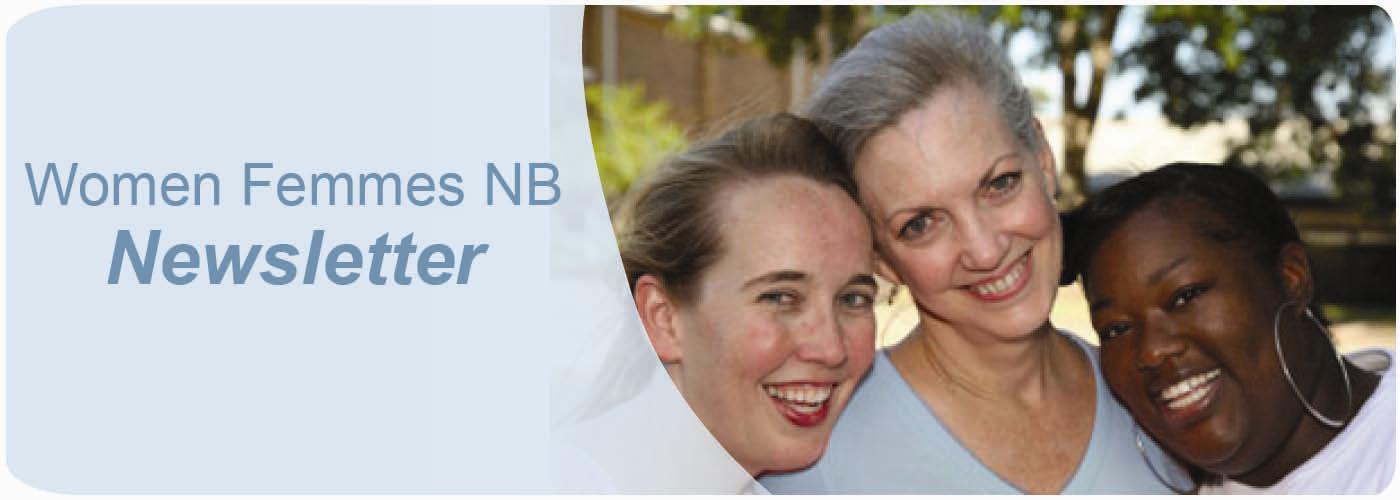
DANS CE NUMÉRO :
- 2 DES 3 VILLES AYANT LES TAUX LES PLUS ÉLEVÉS D'AGRESSIONS SEXUELLES SONT AU N.-B.
- AVIS
- L'HOMICIDE CONJUGAL : LES VICTIMES NOUS INTERPELLENT
- YWCA CANADA : CONCEVOIR DES GRANDES IDÉES PAS À PAS
- AUTONOMISATION DES FEMMES PAR L'ACCÈS À UN MODE D'AVORTEMENT SUR ?
- LOUISE NADEAU, PRIX MARIE-ANDRÉE-BERTRAND 2012
………………………………………………………………….……………
2 DES 3 VILLES AYANT LES TAUX LES PLUS ÉLEVÉS D'AGRESSIONS SEXUELLES SONT AU N.-B.
Fredericton & Saint John sont en deuxième & troisième places parmi les villes canadiennes de plus de 10 000 de population ayant les plus hauts taux d'incidents d'agression sexuelle rapportés à la police en 2011.
Le taux à Fredericton : presque 130 incidents pour 100 000 personnes. À Saint John, presque 115 incidents pour 100 000. Le taux le plus élevé au Canada per capita : Belleville, Ontario, avec presque 137 incidents pour 100 000. Prince George, Red Deer & Winnipeg suivaient. Halifax était en 12e position.
- Statistique Canada. Selon les calculs de la revue MacLeans, déc 2012, A look at the cities with the most lawbreakers, http://bit.ly/VzLqum
AVIS
Boîte à outils de l'égalité femmes-hommes - Recueil de pratiques innovantes de l'éducation à l'égalité entre les sexes & aux stéréotypes en France, ayant pour ambition d'outiller & d'encourager les acteur-rice-s de l'enseignement supérieur à développer des actions pour sensibiliser la future génération de cadres à l'égalité professionnelle & aux enjeux de la mixité dans les organisations. http://bit.ly/133AKJJ
Avortement dans le monde - Nouveau vidéo (4 min.) visant à informer les discussions des décideurs & du public au sujet de la prestation de services d'avortement médicalisé. Partout dans le monde, des femmes se font avorter, & ce pour des raisons similaires. La fréquence de l'avortement a beaucoup moins à voir avec son statut juridique qu'avec le taux de grossesses non planifiées. Institut Guttmacher. Vidéo : http://bit.ly/WZZYFE . Transcription : http://gu.tt/WkNp7K
L'HOMICIDE CONJUGAL : LES VICTIMES NOUS INTERPELLENT
Nous avons étudié les cas d'homicide conjugal au N.-B. remontant à 1990 afin de déterminer si certaines similitudes pourraient contribuer à la conception de stratégies de prévention. Des conclusions :
Les antécédents de violence conjugale, le dossier criminel & la maladie mentale sont des facteurs de risque : La plupart des Néo-Brunswickoises qui ont perdu la vie étaient aux prises avec l'abus dans leur relation. Certaines des femmes avaient passé du temps dans une maison de transition. Les dossiers judiciaires montrent que bon nombre des meurtriers avaient un casier judiciaire.
De nombreux meurtriers n'assument pas leur crime : Bon nombre des meurtriers accusent leur femme ou d'autres personnes d'avoir provoqué le meurtre. La majorité d'entre eux ont avoué être jaloux ou fâchés qu'elle ait mis fin à la relation ou bouleversés qu'elle les ait défiés au cours d'une dispute.
N'importe qui peut être une victime : Leurs antécédents & leurs professions étaient variés : infirmières, traductrices, physiothérapeutes, travailleuses d'usine, commis de magasin & femmes au foyer.
Les armes à feu au foyer risquent d'être mortelles pour les femmes : Plus de la moitié ont été tuées par arme à feu, typiquement un fusil de chasse. À l'échelle nationale, les armes à feu sont associées à 20 % de ces décès. La plupart des meurtres-suicides au N.-B. impliquent une arme à feu.
Mettre fin à la relation n'élimine pas le risque : Près de 35 % des femmes ont été tuées au moment de se séparer ou par la suite. À l'échelle nationale, 80 % des meurtres commis par les ex-maris surviennent dans la première année de séparation. Mais près des deux tiers des témoins silencieuses au N.-B. ont été tuées dans une relation dite « intacte », taux beaucoup plus élevé que la norme nationale. Ces femmes étaient nombreuses à avoir été victimes de violence au fil des ans & avaient quitté leur partenaire pour ensuite y retourner. Certaines se sentaient piégées par les obstacles d'une séparation.
La drogue & l'alcool peuvent augmenter le risque de décès : Les trois quarts des agresseurs avaient les facultés affaiblies par l'alcool ou les drogues au moment du crime.
- Tiré de la recherche par Deborah Doherty, Ph.D., directrice générale du Service public d'éducation & d'information juridiques du N.-B. http://bit.ly/VzME8N
YWCA CANADA : CONCEVOIR DES GRANDES IDÉES PAS À PAS
YWCA Canada a lancé ActYon!, un programme qui aide les femmes de 16 à 29 ans à devenir des citoyennes actives & à promouvoir un engagement civique durable. « L'objectif est de sensibiliser les gens à la capacité qu'ont les jeunes femmes à aborder les problématiques clés. Les jeunes femmes sont particulièrement conscientes des enjeux sociaux & politiques qui les concernent. » Une campagne Des grandes idées pas à pas, encouragera ces femmes à s'exprimer & à oeuvrer pour le changement social & s'achèvera par Le jour du grand changement, une journée d'engagement civique nationale dirigée par des jeunes femmes le 1er mars 2013.
Le programme offrira un site web de réseau social avec ressources, un forum pour débattre des problématiques clés, & un endroit pour documenter & promouvoir leurs activités. Une trousse d'engagement civique comprend des histoires inspirantes de jeunes militantes, des activités créatives & un aperçu des problématiques clés - la violence faite aux femmes, l'égalité économique, la protection de l'environnement, les droits sexuels & génésiques, le racisme, & l'égalité & les droits des peuples autochtones.
- Pour plus d'info ou voir le vidéo sur le programme, http://bit.ly/UlC3Q9 . 17 déc 2012 . FB : http://on.fb.me/10MQaDv .
AUTONOMISATION DES FEMMES PAR L'ACCÈS À UN MODE D'AVORTEMENT SUR ?
« S'opposer aux modèles traditionnels du marché en permettant d'avorter ou d'accoucher en toute sécurité grâce au misoprostol , dans les pays où l'avortement est illégal » - C'est là le titre d'un atelier offert récemment par Women on Waves, organisme engagée pour faire connaître le misoprostol, en tant que mode d'interruption volontaire de grossesse. Ce médicament qui peut déclencher un avortement est habituellement utilisé pour traiter des ulcères ou de l'arthrite, & disponible sans ordonnance dans certains pays à un prix abordable.
À travers le globe, près d'un quart des femmes enceintes choisit d'avorter. Le fait que l'IVG soit légale influence très peu la proportion d'avortements parmi les grossesses. Les avortements illégales – donc dangereuses -causent la mort d'environ 80 000 femmes des suites d'infections, d'hémorragies, de blessures utérines & des effets toxiques des agents censés provoquer un avortement. Une femme toutes les 6 minutes.
L'approche de Women on Waves est triple : 1. leur site web - qui regorge d'informations sur la grossesse, la législation, les modes d'interruption de grossesse, le nom des médicaments selon les pays, avec leur posologie -, propose à des personnes vivant dans des pays où l'avortement est interdit, de commander les médicaments nécessaires par le site. 2. elles font des croisières, permettant de proposer des avortements sur un bateau, dans des eaux internationales. 3. elles travaillent avec d'autres femmes pour partager la « recette » pour un avortement sûr à des femmes en détresse. Dans la mesure où on ne pratique pas des avortements, mais en parle seulement, on ne peut pas être inquiétées légalement. « Savoir = pouvoir » est leur devise. Les femmes sont hors la loi en s'auto-administrant du Misopostrol à des fins d'avortement. Mais le médicament est légal & ne laisse pas de traces (notamment si l'administration est buccale & non pas en partie vaginale).
- Tiré de L'empowerment par l'accès à un mode d'IVG sûre ?, 15 oct 2012, http://bit.ly/YQg7wJ .
LOUISE NADEAU, PRIX MARIE-ANDRÉE-BERTRAND 2012
Louise Nadeau s'efforce depuis plus de 30 ans de combattre les préjugés que subissent les femmes en matière de consommation d'alcool & d'autres substances psychoactives. En 1981, elle & deux collègues publient Va te faire soigner, t'es malade!, un essai qui dénonce, dans un style pamphlétaire, les préjugés sexistes dont sont victimes les femmes souffrant de troubles mentaux. Le livre connaît un véritable succès en se vendant à 30 000 exemplaires. En 1982, elle obtient des fonds du ministère des Affaires sociales du Québec pour produire un état de la question sur l'alcoolisme chez les femmes en Amérique du Nord. La monographie publiée met de l'avant que les chemins qui mènent à l'alcoolisme diffèrent selon le genre. Les facteurs environnementaux qui poussent les femmes à consommer de l'alcool à l'excès sont différents des hommes : « Les hommes boivent ensemble, influencés par leurs pairs, & certains deviennent alcooliques presque par habitude. Pour ce qui est des femmes, dit Mme Nadeau, c'est souvent à la suite d'événements tragiques qu'elles consomment de l'alcool de manière excessive. Et ce sont souvent des femmes très seules, sans soutien social. » En 1984, dans le cadre de sa thèse de doctorat, elle rencontre des femmes qui souffrent de dépression & qui ont commencé à boire à l'excès à la suite d'événements graves, mais aussi de diverses violences subies dans l'enfance. « Dans un monde où la grande consommation d'alcool des femmes est réprouvée, celles qui deviennent alcooliques ont des niveaux de détresse & de taux de troubles mentaux concomitants beaucoup plus élevés que les hommes »…. « J'ai constaté que la criminalité de ces hommes, leur toxicomanie & les autres troubles mentaux dont ils souffraient étaient inséparables d'abord de la pauvreté & ensuite de leur cheminement de vie, de leur éducation & de leur enfance. » Sa monographie, Meilleures pratiques : troubles concomitants de santé mentale & d'alcoolisme & de toxicomanie (2002), écrite en collaboration pour Santé Canada, est considérée comme une référence.
EN FIN DE COMPTE
Près de l'ancienne Kyoto vivait un samouraï prestigieux. Malgré son âge, on racontait qu'il était encore capable d'affronter n'importe quel jeune combattant. Un jour se présenta un guerrier réputé pour son manque de scrupules. Il était célèbre pour son art de la provocation, attendant que son adversaire fasse le premier mouvement. Il pouvait ainsi profiter de l'erreur & répliquer avec la vitesse de l'éclair. Il n'avait jamais perdu un combat. Comme il connaissait la réputation du vieux samouraï, il était venu, résolu à le vaincre.
Le vieux maître accepta le défi. Ils se réunirent devant le monastère & les insultes commencèrent. Le jeune cracha au visage du samouraï, lui déversant un flot d'offenses & lui lança des pierres. Il fit tout son possible pour le faire dégainer son sabre afin de lui porter un coup fatal. Le vieux moine resta impassible.
A la tombée de la nuit, se sentant épuisé & humilié, le jeune se retira. Les élèves questionnèrent le Maître: Comment avez-vous pu supporter une telle indignité, Maître ? Pourquoi ne pas avoir sorti votre katana ? Même si vous deviez être vaincu, ne valait-il pas mieux agir plutôt qu'exhiber votre lâcheté ?
- Si quelqu'un vous tend un cadeau, & que vous ne l'acceptiez pas, à qui appartient-il ?
- A celui qui le donne, répondit un disciple.
- Cela vaut également pour la colère, la haine & les insultes, lorsqu'elles ne sont pas acceptées, elles appartiennent toujours à celui qui les porte dans son cœur.
- Tiré du blog l'Abreuvoir des dragons.
[email protected]
Sans frais : 1-877-253-0266
télécopieur : (506) 453-7977
www.gnb.ca/femmes
![]()
Women Femmes NB
est publié deux fois par mois par la Direction des questions féminines du gouvernement provincial. Il diffuse des nouvelles sur les questions d’égalité - des événements, des rapports, des initiatives et des renseignements nous provenant des groupes de femmes, des gouvernements, des universités et autres.
**Les textes fournis par des organismes non gouvernementaux seront publiés dans la ou les langues dans lesquels ils nous sont fournis
